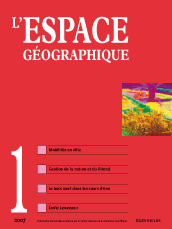

Fixed and mobile: homeless does not necessarily mean rootless (1 fig., 3 encadrés, 4 tabl.)
By referring to “fixedness”, the French expression for homelessness (sans domicile fixe - “of no fixed address”) implicitly suggests mobility. This text explores these concepts of fixedness and mobility using the results of a regional study. The conclusions qualify the frequent perception of extreme exclusion. The homeless are not necessarily without ties. Geographical anchoring is apparent, and the immobility that could be interpreted as a handicap is regarded as a resource, and displacement as isolation.
keywords: FAMILY, FIXEDNESS, HOMELESS, MOBILITY, ROOTING
Walk in the city. A sensory matter
Walking in the city is a recurring motif of 19th century literature. Walter Benjamin’s flâneur still dominates our mental imagery. However, while strolling in the city requires observational skills, of which the flâneur remains an accomplished artist, it also engages the pedestrian’s body and senses. The article seeks to reveal this sensory dimension of walking. It draws on a thematic reading of recent research from the fields of anthropology, sociology and town planning. Described as a “technique of the body” or an “ordinary social act”, walking is also “the instrument of composition of the city”. By walking, the pedestrian anchors himself to the city.
keywords: BODY, PEDESTRIAN, PERCEPTION, URBAN PUBLIC SPACE, WALKING
Slow networks versus car dependence? Concept and its implications in urban areas (2 fig.)
The car accessibility induced by road networks tends to make long routes more efficient, encouraging urban sprawl and car dependence. After explaining this relationship, this paper describes the “slow network” concept, whose metric intrinsically favours short routes. It then discusses the use of slow networks as a policy lever to combat urban sprawl and car dependence. Lastly, it describes the measures required to support the transition from the current system of urban operation and the new system based on the physi cal proximity of life spa ces resul t i ng from the application of sl ow networks.
keywords: AUTOMOBILE DEPENDENCE, MODAL CHOICE, ROAD NETWORK, SLOW METRIC
Between “over-visiting” and “over-protection” of coastal natural sites (1 fig.)
This paper proposes some thoughts on the stakes of opening natural coastal sites to visitors. Although most natural sites in France are open to the public, their popularity is raising concern about degradation. This prompts discussion about the stakes of managing such sites. Conservation of biodiversity for future generations is certainly an issue, but the best interests of humanity cannot be reduced to biodiversity alone. Informed, controlled, adjustable public access, appropriate to each site, can create the conditions for sustainable conservation by enhancing awareness of our natural heritage.
keywords: BIODIVERSITY, COAST, COASTAL DUNES, NATURAL HERITAGE, PUBLIC ACCESS, RELATIONSHIP BETWEEN MAN AND NATURE
Driftwood in French riverscapes: key elements for a new management perspective (4 fig., 2 photos)
This article focuses on the increasing interest in driftwood in rivers as a consequence of negligent watercourse maintenance and consequent spontaneous reforestation. In-channel wood may cause damage, but its ecological benefits are also demonstrated. Therefore, preserving wood or reintroducing it as in other geographical areas seems difficult insofar as legislation and the socio-cultural environment hamper improving management of wood in French watercourses. This article shows that driftwood is assessed negatively by public perception. Such irrational factors may influence policy on wood removal.
keywords: ASSESSMENT, MAINTENANCE, PUBLIC PERCEPTION, RIVER CHANNEL, WOODY DEBRIS
Biodiversity conservation, or the construction and disappearance of “the local”
This article examines the concept of “local” in the context of globalisation. Based on biodiversity conservation policies in southern Africa, the article shows that the construction of a “local community” institutionalises situations with no local economic rationality, even though that rationality is the core of community empowerment policies. The article also demonstrates that the mobilisation in support of conservation shows strong similarities with global capitalist trends when these become intangible and dissolve borders between work and private life. This mobilisation thus seems set to invalidate the concept of “local”.
keywords: CONSERVATION, LOCAL, MOBILISATION, PARTICIPATION, SOUTHERN AFRICA
Émile Levasseur, a liberal in geography (1 encadré)
An important period in the history of French geography, the 1870s were not, however, a watershed. This is illustrated by the intellectual trajectory of Émile Levasseur. A liberal polymath, he contributed to the recognition of geography. He made the case for its usefulness to schoolchildren and economic actors seeking to exploit the earth’s resources. He advocated reform of school curricula and developed the field of economic geography. He thus made a contribution to the intellectual trends and university teaching of geography, which would benefit geographers at the time of Vidal.
keywords: ECONOMIC GEOGRAPHY, HISTORY OF GEOGRAPHY, LEVASSEUR, LIBERALISM, SCHOOL GEOGRAPHY
Book reviews
In this issue of l’Espace géographique, you will find critical reviews of the following books
JOLLIVET M. (dir.) (2001) Le Développement durable, de l’utopie au concept: de nouveaux chantiers pour la recherche. Paris: Elsevier, coll. «NSS», 288 p.
MATHIEU N., GUERMOND Y. (éd.) ( 2005) La Ville durable, du politique au scientifique. Cemagref Éditions, CIRAD, IFREMER, INRA Éditions, coll. «Indisciplines», 285 p.
VANDERMOTTEN C. (dir.) (2002) Le Développement durable des territoires. Bruxelles: éditions de l’Université de Bruxelles, coll. «Aménagement du territoire et environnement», 231 p.
DA CUNHA A., RUEGG J. (dir.) (2003) Développement durable et aménagement du territoire. Lausanne: Presses polytechniques et universitaires romandes, 350 p.
PAULET J.-P. (2005) Le Développement durable. Paris: Ellipses, coll. «Transversales Débats», 189 p. (Guy Baudelle, université de Rennes II)
DUREAU F., BARBARY O., GOUËSET V., PISSOAT O. (2004). Villes et sociétés en mutation. Lectures croisées sur la Colombie. Paris: Anthropos, coll. «Villes», 370 p. (Jean-Paul Deler, CNRS Bordeaux)
L’espace géographique 4/06![]()
![]() L’espace géographique 2/07
L’espace géographique 2/07
For subscribe or buy this issue: BELIN
![]() L’Espace géographique: contents
L’Espace géographique: contents
Last modified: March 29, 2007